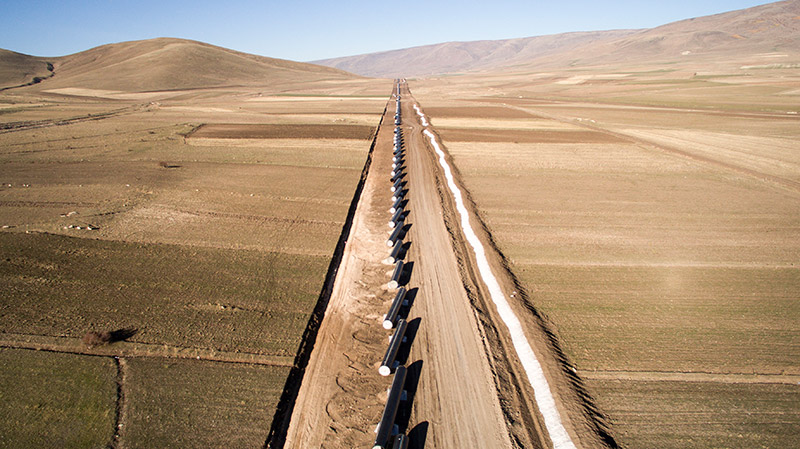The European Bank of Reconstruction and Development (EBRD) has approved a half billion dollar loan to a pipeline that will link Caspian sea gas fields with southern Italy.
The southern gas corridor (SGC) is Europe’s biggest fossil fuel project, estimated to cost $40 billion. On Wednesday, the EBRD became the third development bank to loan public money to the project.
“[The SGC] will strengthen Europe’s energy security, promote interconnectivity and open gas markets,” a bank spokesman said in a statement. “It will also help provide a better energy supply mix for consumers in the Balkans and south-eastern Europe as well as achieve significant CO2 reductions through the substitution of obsolete coal-fired power plants.”
The full story: EU bank to decide huge public loan to Europe’s biggest fossil fuel project
On Tuesday, Climate Home News reported that experts had criticised the EU for backing the project when it would not assuage fears over Europe’s energy security.
“I have doubts about any significant quantities of additional gas going along that route, because it’s not clear which gas fields in the Caspian they could come from,” Oxford University’s Simon Pirani told Climate Home News.
The $500m loan will be given to the Azerbaijani government and state oil company SOCAR. The Aliyev government has been heavily criticised for its repression of civil society and journalists, including by the global extractive industries watchdog EITI. Azerbaijan withdrew from EITI last year after it failed to improve its standing with the organisation.
Recently, the Guardian revealed the existence of a massive Azerbaijani slush fund being used to finance lobbyists and buy influence across Europe. One of the ERBD’s directors Kalin Mitrev reportedly received almost $500,000 from the scheme. The bank said on Wednesday that Mitrev was not involved in the loan decision.
By lending money to Azerbaijan, the ERBD breached its own principles “of multiparty democracy, the rule of law and respect for human rights”, said Anna Roggenbuck, policy officer at CEE Bankwatch Network.
Tim Ratcliffe, senior campaigner at 350.org, said: “With significant amounts of existing gas infrastructure sitting idle, and demand across the region falling, there is simply no reason for public banks such as the EBRD to be sinking money into climate-wrecking fossil fuel projects. Rather than a European dash for gas we need investment in just renewables to provide clean, affordable energy for everyone.”
The World Bank and Asian Infrastructure Investment Bank have already committed $1.4bn in loans to the project. The European Investment Bank is considering a $2bn loan. It was due to make an announcement on Wednesday, but this has been postponed.
What is the Southern Gas Corridor?
BP calls it “arguably the global oil and gas industry’s most significant and ambitious undertaking yet”. It is a three part pipeline that, if completed, will carry gas from the Shah Deniz 2 oil field in Azerbaijan’s Caspian Sea through Georgia, Turkey, Greece, Albania into southern Italy.
Sections:
- South Caucasus Pipeline (SCP) – Azerbaijan, Georgia
- Trans Anatolian Pipeline (Tanap) – Turkey
- Trans Adriatic Pipeline (Tap) – Greece, Albania, Italy
Source: TAP
Ownership: At least 11 different companies are involved in the corporate ownership structures of the various sections. Major players include BP, Azerbaijan’s state oil company SOCAR, Turkish Petroleum, Petronas, Lukoil, Total and Snam.
Public finances: The European Investment Bank and Asian Development Bank are considering publicly-backed loans for the development in excess of $500m each. The World Bank and Asian Infrastructure Investment Bank have already committed $500m and $600m.

